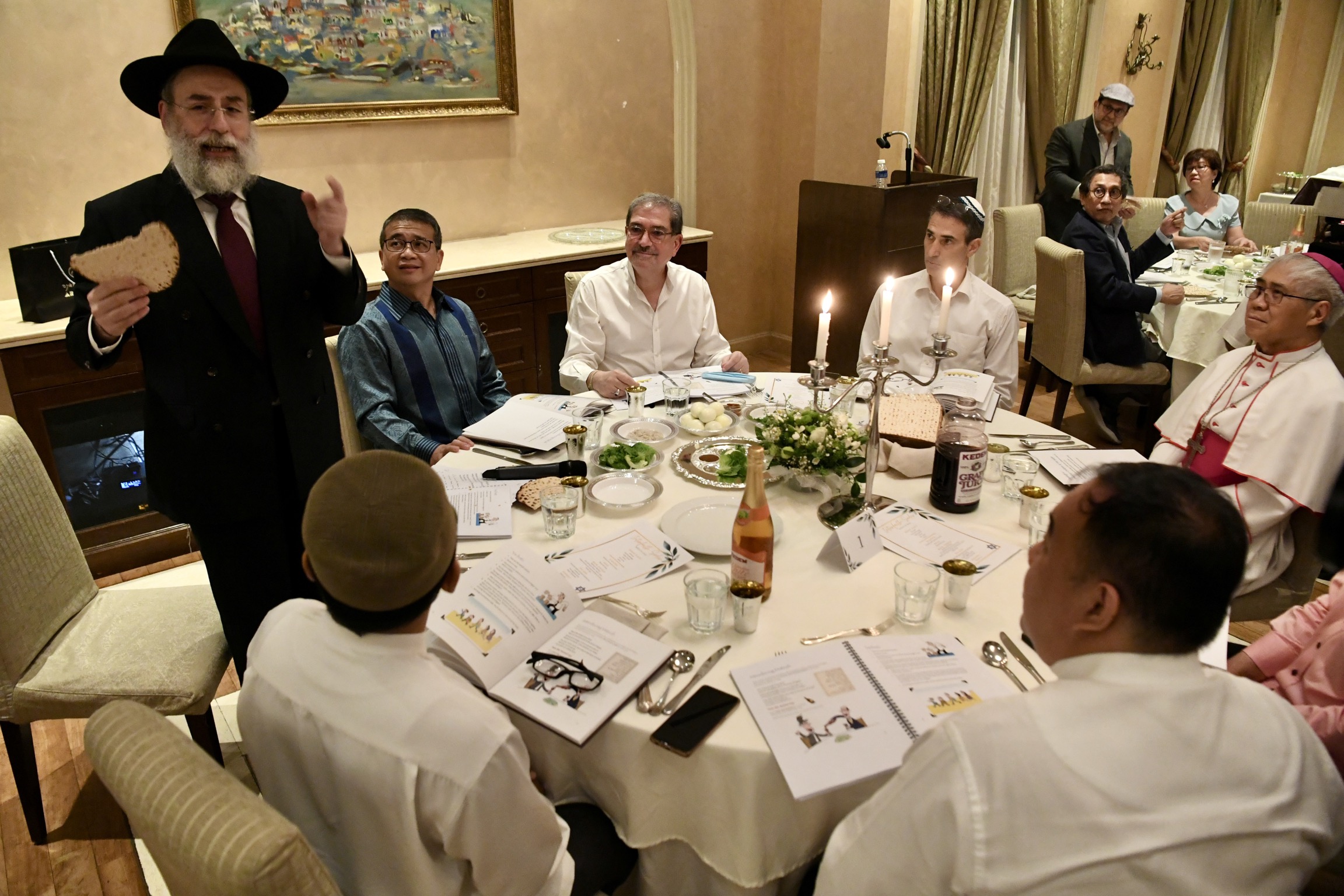Parsley in salt water and unleavened bread: First interfaith Passover feast in Waterloo Street
Sign up now: Get ST's newsletters delivered to your inbox

(From left) Chief rabbi of Singapore Mordechai Abergel, Minister of Community, Culture and Youth Edwin Tong and other religious leaders at the Jewish ceremony.
ST PHOTO: DESMOND FOO
Follow topic:
SINGAPORE - With a dip of parsley in salt water and hymns sung by a boys choir, about 100 people began an especially unique Jewish ceremony at the Jacob Ballas Centre in Waterloo Street on Wednesday night (March 30).
Ten tables of guests ate and drank - with nary a mask in sight, and in such a large group for the first time since the pandemic - as they commemorated the ritual seder feast ahead of the Jewish Passover on April 15.
What made the three-hour ceremony particularly special was the participation of Mufti Nazirudin Mohd Nasir, the Roman Catholic Church's Archbishop William Goh, president of the Singapore Taoist Federation Tan Thiam Lye, and more than 10 other religious leaders.
They took their cue from Chief Rabbi of Singapore Mordechai Abergel, in turn reciting passages about the Jews' exodus from Egypt more than 3,000 years ago, in the first interfaith Passover Seder that the Jewish Welfare Board has organised here since it was set up in 1917.
"Passover is called the festival of freedom, because on that day, freedom was embedded in our souls. Although we continued to suffer in subsequent exiles, Jews were always conscious of the fact that their bodies may be suffocated, but never their souls," Mr Nash Benjamin, president of the Jewish Welfare Board, said in his opening address.
The Passover festival is one of three biblical festivals in the Jewish calendar, and is the most loved and observed by Jews all over the world. It marks the deliverance of the Jews from the bondage of Egypt and the birth of the Jewish nation.
Rabbi Abergel spoke about the Jews' journey from their escape from slavery in Egypt through God to surviving the Holocaust and setting up Israel in the 20th century, while instructing those present on how a traditional seder is eaten.
A seder usually lasts five hours and is held so that children can ask their parents questions about their own culture, he said. The ceremony on Wednesday was shorter, skipping some steps, but still continued deep into the night.
Unlike the usual Jewish seder, it was alcohol free, with wine replaced with sparkling grape juice, due to the religious sensibilities of representatives from the other religions.
After eating parsley, unleavened bread and eggs, guests were then treated to a fuller five-course vegetarian meal that included bourkas - a soft pastry - with mushroom sauce, a dumpling soup, mushroom rendang, tofu and yellow rice, salads and pomegranate and coconut ice cream.
Mufti Nazirudin chose to read a passage from Chapter 26 of the Quran that described Moses' conversation with the Egyptian pharaoh holding the Jews in captivity. He said he chose to read from the Quran as it fit the interfaith harmony on display on Wednesday.
"There are a lot of similarities between the Jewish tradition as well as Islam. The Passover is the story of the Exodus, and you find similar stories in the Quran. I thought it useful to share our scripture on an occasion like this," he said.
Minister of Community, Culture and Youth Edwin Tong, the guest of honour, said the Jews have contributed much to Singapore's harmony.
"The harmony is a cherished one, and we must constantly work at preserving it. Coming together, sharing a meal, and celebrating each other's key moments give true meaning to our desire to foster a multi-religious and multicultural Singapore," he said.
"As we ease our safe management measures and transition towards an endemic stage, rebuilding societal bonds, the mutual trust and friendships that we rekindle this evening will enable us to emerge as a more cohesive and resilient society."

